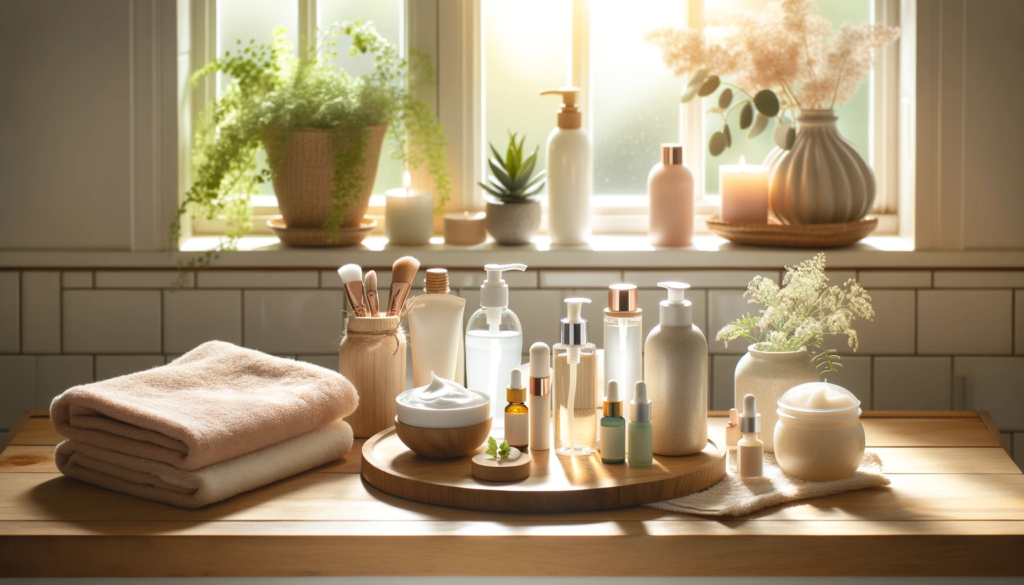Skin care timing has almost as much significance as what products you choose to apply to your skin. This debate of whether it’s best to perform the morning versus the night skin care routine is a discussion between beauty enthusiasts and dermatologists over years. There are different routines, both distinct, serving for your skin to require something differently at a given point of the day. We are going to delve into the world of morning versus night skincare, and you can expect to receive practical tips, real-life examples, and science behind each to create a routine that works best for your skin.
Timing is Everything in Skincare
Skincare is not only about what you apply, but when you apply it. The skin has its own needs that vary at different times of the day, due to environmental exposures, natural processes in the body, and circadian rhythm. To get a really effective skincare routine, you must know about these changes.
Circadian Rhythm and Your Skin
Just like the rest of your body, your skin follows a circadian rhythm. During the day, your skin serves as a barrier to protect against harmful environmental aggressors such as UV rays, pollution, and bacteria. At night, however, your skin shifts into repair mode, focusing on regeneration and rejuvenation. This natural cycle highlights the importance of adjusting your skincare routine to fit the time of day.
Morning Skincare Routine: Start Your Day Right

The purpose of your morning skincare routine is to prepare your skin for the stress it will face throughout the day, such as UV rays and pollution. This is also the time when you are preparing your skin for makeup, if you use it. This routine involves hydration, protection, and prevention to keep your skin healthy and glowing all day long.
Steps and Products to Be Used for Morning Routine:
- Cleaning: Begin with a gentle cleanser that helps clean off the layers of oil, sweat, and other impurities that may have accumulated overnight. This helps prep your skin to better absorb all the following products.
Example: Glycerin-enriched, mild foaming cleanser to hydrate and clean. - Toning: A toner balances your skin’s pH levels and can add an extra layer of hydration or even target specific skin concerns.
Tip: Opt for alcohol-free toners, which are gentler and won’t dry out your skin. - Antioxidant Serum: Vitamin C is the ultimate serum that will keep free radicals from attacking your skin and may even amplify your sunscreen.
- Example of use in real life: The Journal of Clinical and Aesthetic Dermatology has shown a significant reduction in photodamage caused by vitamin C, hence showing how much your skin needs this antioxidant serum.
- Moisturizing: Use a lightweight, non-comedogenic moisturizer that will lock in hydration and act as a makeup base.
Tip: Hyaluronic acid and ceramides are good for moisturizers for added hydration and repair of the skin’s barrier. - Sun Protection: Sunscreen is a no-brainer. It protects your skin from UV damage, which causes premature aging and skin cancer.
- Sample real-life experience: Dermatologists advise topical application of the broad-spectrum SPF of no less than 30. With constant application, the risk factors of developing carcinomas in one’s skin has been established by studies.
Advantages of Doing a Morning Ritual:
- Prevention: Protects the skin against the adverse climatic conditions affecting the human life.
- Avoidance: Helps guard against early stages of aging that include hyper-pigmentation to mention but one.
- Primer: Helps offer an even spread for makeup if interested.
ALSO READ: “Effective Solutions for Managing Acne, Dryness, and Other Common Skin Conditions”
Night Care Routine: Repair and Revitalization Time

Your night care routine is the time when your skin gets its repair processes. At night, the permeability of your skin increases, making it easier for active ingredients to penetrate deeper into the skin. Night is a good time for rejuvenation and restoration of the skin after being exposed to all sorts of pollutants and stress throughout the day.
Key Steps and Products for Your Night Routine:
- Double Cleansing: This is definitely a must if you wear makeup and sunscreen. So, first an oil-based cleaner will remove your makeup and impurities while a water-based cleaner will help to clean all of your pores.
Example: Balm first, and then a very gentle gel so that all your residue is removed. - Exfoliation: Exfoliating 2-3 times a week removes dead skin cells, promoting cell turnover and a brighter complexion.
- Tip: Use chemical exfoliants like AHAs (alpha-hydroxy acids) or BHAs (beta-hydroxy acids) for a more effective and less abrasive exfoliation.
- Toning: As with your morning routine, a toner is beneficial in the evening too. Choose one with exfoliating or hydrating properties, depending on your skin’s needs.
- Case study: Users of glycolic acid toners often notice smoother and more radiant skin from regular use.
- Serum or Treatment: Night time is best reserved for targeted treatments such as retinoids, peptides, or hydrating serums.
- Real-life example: Retinoids resulted in a marked clinical improvement in fine lines and wrinkles at night, as reported by one clinical trial.
- Moisturizing: Use a richer moisturizer or night cream that will help your skin retain its moisture and perform its natural repair processes.
Tip: Look for products containing niacinamide or shea butter that will help the skin replenish moisture and be soothed overnight. - Eye Cream: For those with issues such as dark circles or puffiness, eye cream can make a great addition to your night time routine.
- recommendation: It generally recommends that eye creams with the active ingredients of caffeine or peptides may be needed to help deal with those problems.
Benefits of Night Routine
Repair-The schedule helps your skin mend and rejuvenate.
Hydrating-Replenishes the moisture lost in the day.
Rejuvenation-Increase your skin’s texture, tone, and health.
Morning vs. Night Routine: Which One Works Best?
Case Study: Case of Sarah A 35 year professional who complains that her skin looked dull with blotches in an uneven way sometimes had breakout breakouts on certain areas and sometimes had these flare-ups for quite a bit, she developed an appropriate plan.
- Morning Routine: Sarah used gentle cleanser, vitamin C serum, lightweight moisturizer, and broad-spectrum SPF. The daily routine protected her skin from pollutants and sun damage, keeping her fresh throughout the day.
- Night Routine: Double cleansed, exfoliating twice a week, using a retinol serum, and rich night cream was part of her bedtime routine. This helped her skin to regenerate while she slept.
Results: Three months into the routine, Sarah’s skin looked improved in texture, brightness, and overall appearance. Breakouts began to get less frequent, and her complexion had more even tone and radiance.
Conclusion
It’s very important, both for morning and night routines, to really get healthy-looking, glowing skin. The morning focus is on protection and prevention. On the other hand, the night routine focuses on repair and rejuvenation. Through this kind of knowledge about the unique needs of the skin at specific times of day, you’re going to notice real improvements.
ACTIONABLE TIPS FOR EACH
- Consistency: Continue with the routine for at least 3-6 months to get visible results.
- Listen to your skin: Change the routine according to how your skin responds and what it needs at that time.
- Seek professional advice: Get a dermatologist to prescribe the routine as per your skin type.
With morning and nighttime skincare routines, you can truly take advantage of all that your skincare routine has to offer for a healthier, brighter complexion.
FAQs
- Can I just skip my morning skincare routine when I’m running late?
Resist the temptation to cut corners and forgo sunscreen at minimum. If time is short, clean, moisturize, and apply SPF at least. - How often should I exfoliate in my nighttime routine?
Exfoliate 2-3 times a week. Over-exfoliating irritates the skin, so you need to pay attention to its needs and balance accordingly. - Can I use the same moisturizer for both morning and night?
Yes, but night creams are richer and more hydrating, which helps in healing the skin overnight. - Do I need a separate cleanser for the morning and the night?
Not necessarily. A gentle cleanser can be used for both. But if you have applied makeup or sunscreen, a double cleanse at night is in order. - At what age should I begin using anti-aging products?
It’s never too early to start. Using products with antioxidants and sunscreen is essential from your 20s, and incorporating retinoids or peptides in your late 20s or early 30s can help address early signs of aging.

